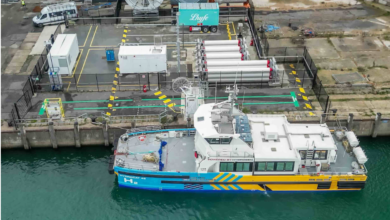PowerCell to supply fuel cell system for Towboat
Batteries are not suitable for decarbonising the towboat sector due to their restrictions on the range, operation areas and uptime.

PowerCell has received a multi-MW fuel cell system order from US-based Maritime Partners LLC, worth approximately 37 MSEK (3.6 MUSD) for delivery during the third quarter of 2023.
Maritime Partners plans to launch the world’s first hydrogen-electric towboat, M/V Hydrogen One, in 2023.
The order comprises several PowerCellution Marine System 200 with a total effect of multiple megawatts and related services, including installation, class approval and commissioning support. Maritime Partners, a privately held company, is the leading provider of tailored financing and leasing solutions for the US maritime industry. The company’s fleet of over 1,600 vessels transport commodities that comprise the building blocks for the US domestic economy, including agricultural products, chemicals, aggregates, crude oil and refined petroleum products.
Within the Hydrogen One project, fuel cells running on hydrogen produced by on-board reforming of methanol will provide continuous power to the towboat over extended periods. Methanol is a common fuel within the marine industry and is available in 88 of the top 100 ports worldwide. Due to the high energy density of methanol, M/V Hydrogen One will get a range of 550 miles.
M/V Hydrogen One will be compliant with the International Maritime Organization’s IMO 2030 requirements. IMO 2030 targets a reduction of greenhouse gas emissions by 40% up to 2030. Other project participants include ABB, Elliot Bay Design Group and e1 Marine.
Richard Berkling, CEO of PowerCell Sweden, said, “The order is proof that we have developed a leading fuel cell technology which we have managed to industrialise for large and demanding applications.”
Austin Sperry, President at Marine Partners, said, “Fuel cells running on reformed methanol is a commercially viable solution as it provides the boat with the same operating characteristics as a traditional propulsion system but in a much more sustainable way.”
